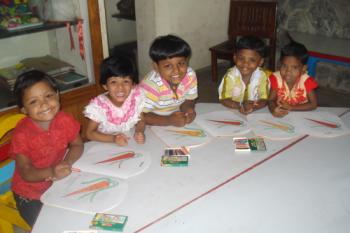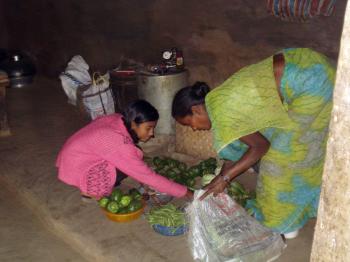One third of Rourkela's population lives in slums

Colouring in together with friends! (photo: SOS archives).
The state of Orissa remains amongst the poorest in the county, and the rate of poverty reduction has also been slower than elsewhere in India. An estimated 40 per cent of the state's urban population lives in poverty. In spite of various government programmes, the high level of unemployment remains a concern. It is estimated that around one third of the total urban population of Rourkela lives in slums. Over 90 per cent of those living in slums have no access to decent housing or basic infrastructure.
Children are the first victims of the deprived social and economic situation. Malnutrition is common, and Orissa has a higher-than-average infant mortality rate – 73 per 1000 births. Many of these children die from waterborne diseases such as cholera. Their deaths could be prevented by the provision of clean drinking water, sanitation facilities and timely medical treatment. Girls in particular face discrimination. For example, girls are more likely than boys to drop out of school. Although the average literacy rate stands at a relatively high 75 per cent, there is a big difference between the male rate – 81 per cent – and the female rate – 69 per cent.
The majority of parents living in poverty in Rourkela struggle to make a living and often find it hard to meet the emotional and material needs of their children. Many of these children do not go to school but can be found on the streets during the day, begging or hawking to contribute to the family income. They are very vulnerable, and in recent years, not only has the number of crimes committed against children risen, but there are numerous reports of children being kidnapped and trafficked to other Indian states.
Working closely with the community, aiming for self-sufficiency
The area was severely affected by the 1999 cyclone. At first the SOS Children's Villages' emergency relief programme focused on providing medical aid to people living in the area. Many children lost parental care and although we worked hard to find their living relatives, or to place them in foster care, it soon became clear that there was a need for us to provide additional family-based care. Today, we work closely with local agencies and community-based organisations in order to identify families who are in need.
What we do in Rourkela

A woman from our family strengthening programme now sells vegetables to make a living (photo: SOS archives).
When children can no longer stay with their families, they can find a loving home with one of the fifteen SOS families, where they grow up with their sisters and brothers. The children attend the local kindergartens and schools, thus making friends with children from neighbouring families and integrating into the community. When young adults are ready to leave their SOS families they can join our SOS Youth Programme. With the support of qualified professionals they are guided through this new stage of their lives, as they start vocational training courses, attend higher education or look for work. The young people are encouraged to develop perspectives for their future, learn to shoulder responsibility and increasingly make their own decisions.